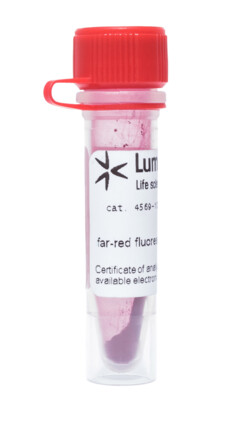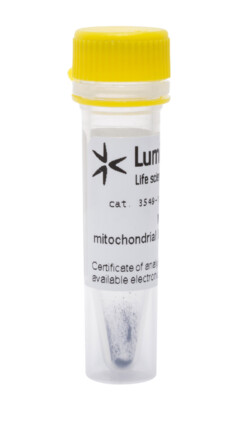LUCS® 5, far-red fluorescent nucleic acid stain
| Cat. # | Quantity | Price | Lead time | Buy this product |
|---|---|---|---|---|
| 1L010 | 50 uL, 5 mM/water |
$169
|
in stock | |
| 2L010 | 250 uL, 5 mM/water |
$569
|
in stock |

LUCS® 5 (1,5-bis{[2-(di-methylamino) ethyl]amino}-4,8-dihydroxyanthracene-9,10-dione, DRAQ5®) is a cell-permeant far-red fluorescent DNA dye for live and fixed cell imaging and analysis.
LUCS® 5 readily permeates the cell membranes and intercalates between A-T bases of double-strained DNA (dsDNA). The dye has a high affinity to dsDNA and shows negligible binding to RNA and mtDNA. LUCS® 5 does not exhibit a fluorescence enhancement on DNA binding; thus, the measured fluorescence is proportional and stoichiometric to the quantity of nuclear DNA content of the cell.
Due to its cell permeability, LUCS® 5 is useful for assessing DNA content and cell cycle but is not suitable for use as a viability dye. As with other cell-permeant DNA intercalating dyes, LUCS® 5 may inhibit cell division in long-term assays, so this effect should be tested before the experiment.
In microscopy and high-content screening, LUCS® 5 is useful as a nuclear counterstain for both live and fixed specimens. In flow cytometry, LUCS® 5 allows direct blood and bone marrow cell discrimination without preliminary red blood cell lysis, fixation, permeabilization, or RNase treatment.
LUCS® 5 has absorbance peaks at 617 nm and 665 nm and an emission peak at 701 nm (when intercalated into dsDNA). Thus, this dye is spectrally compatible with the most common labels, such as GFP, FITC, R-PE, or RFP. LUCS® 5 also has high photostability and demonstrates no photobleaching effect during imaging.
LUCS® 5 solution should be stored at 2-8 °C. Do NOT freeze the solution! LUCS® 5 may precipitate out of the solution when frozen. Re-dissolving it may not be easy.
Excitation and emission spectra of LUCS® 5 (DNA–dye complex)

Recommended protocol
Calculator
Customers also purchased with this product
General properties
| Appearance: | blue-violet solution |
| Molecular weight: | 485.41 |
| CAS number: | 252903-95-0 |
| Molecular formula: | C22H30Cl2N4O4 |
| IUPAC name: | 1,5-bis{[2-(di-methylamino) ethyl]amino}-4, 8-dihydroxyanthracene-9,10-dione |
| Solubility: | water, DMSO |
| Quality control: | NMR 1H and HPLC-MS (95+%) |
| Storage conditions: | Store at temperature between +2 °C and +8 °C 12 months. Do not freeze! Transportation: at room temperature for up to 3 weeks. |
| MSDS: | Download |
| Product specifications |
Spectral properties
| Excitation/absorption maximum, nm: | 665 (complex) |
| Emission maximum, nm: | 701 (complex) |

























 $
$ 
